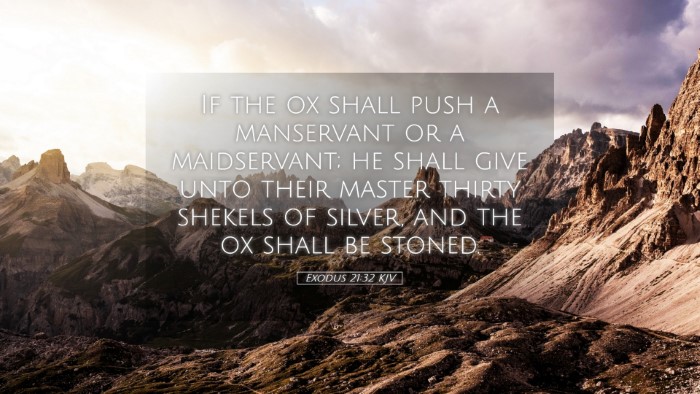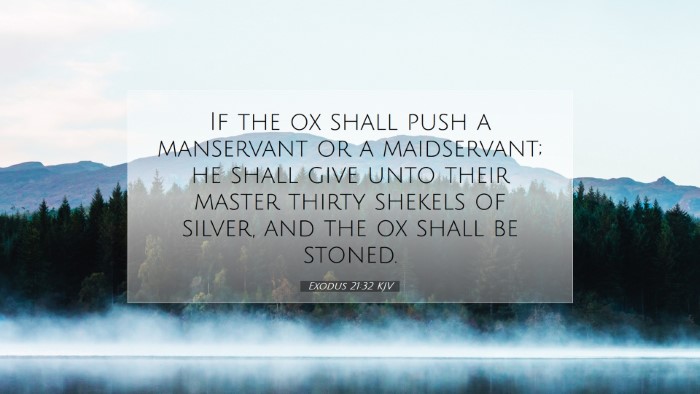Commentary on Exodus 21:32
Verse: "If the ox shall push a manservant or a maidservant; he shall give unto their master thirty shekels of silver, and the ox shall be stoned."
Introduction
Exodus 21:32 is part of the covenant laws given to the Israelites that address various aspects of social and moral conduct. This verse specifically deals with the situation when an ox causes harm to a servant, reflecting on the principles of liability, justice, and compensation in ancient Israelite culture.
Summary of Key Themes
- Legal Responsibility: This verse underscores the importance of accountability in relationships, particularly between masters and servants.
- Value of Human Life: The monetary value assigned to a servant's life illustrates the seriousness of their well-being and the consequences of negligence.
- Divine Justice: The mandate for the ox to be stoned indicates severe consequences for negligence that resulted in harm to another.
Commentary Insights
1. Legal Responsibility and Accountability
Matthew Henry emphasizes the notion of responsibility. The master’s obligation to pay thirty shekels when his ox injures a servant demonstrates the biblical principle that one is responsible for the behavior of their property. Henry notes, “The law here implicitly teaches that it is the duty of masters to look after their servants, and to keep that which is under their care from being a danger to others.”
2. Value of Servants:
Albert Barnes highlights that the price of thirty shekels reflects a significant valuation on human life, especially within the context of servitude. He notes that while servants were not regarded with the same intrinsic dignity as free persons, their lives nonetheless hold considerable worth in God's eyes, and thus proper legal protections must be afforded to them.
3. Divine Justice and Compensation:
Adam Clarke elaborates on the consequences outlined in this law, noting that the stoning of the ox represents a divine decree ensuring that justice is served. Clarke writes, “This was to show that the life of the servant must be as sacred, and as carefully protected, as that of any other person, and that the law against injury was stringent.” The punishment serves not only as recompense but also as a deterrent against negligence.
Applications for Today
- Ethics of Ownership: The modern application of this principle extends to how individuals and organizations take care of their 'oxen' or resources. It raises critical questions about the moral responsibilities of employers, business leaders, and resource management.
- Valuing Human Dignity: In contexts where individuals are viewed as mere commodities or property, this verse serves as a stark reminder of the biblical stance on human dignity and value, advocating for social justice and equitable treatment.
- Responsibility for Causing Harm: This passage challenges contemporary readers to consider their own responsibilities in preventing harm—be it through negligence or intentional acts—in their communities and professional environments.
Conclusion
Exodus 21:32 provides insight into the social structure and moral imperative of ancient Israel. The integration of justice, responsibility, and accountability within the legal framework reflects God’s desire for a society that values both human life and effective stewardship of all resources. For pastors, students, and theologians, this verse offers a rich ground for exploring themes that remain relevant in contemporary discussions on ethics, justice, and the sanctity of life.


